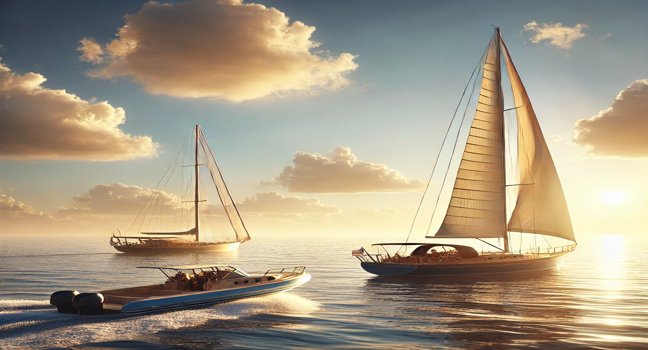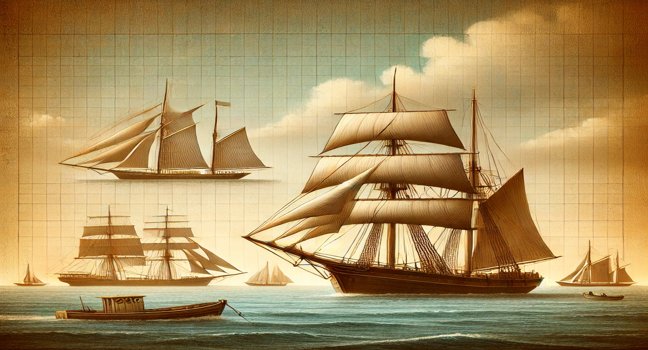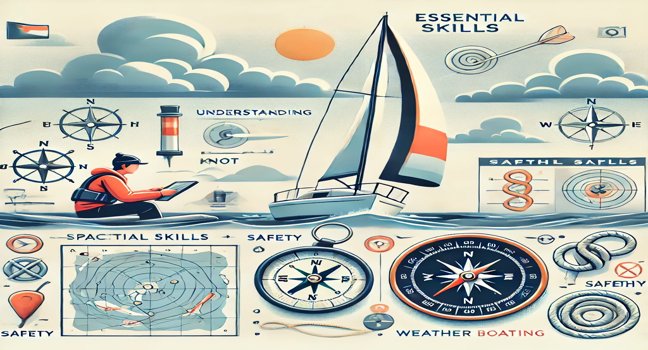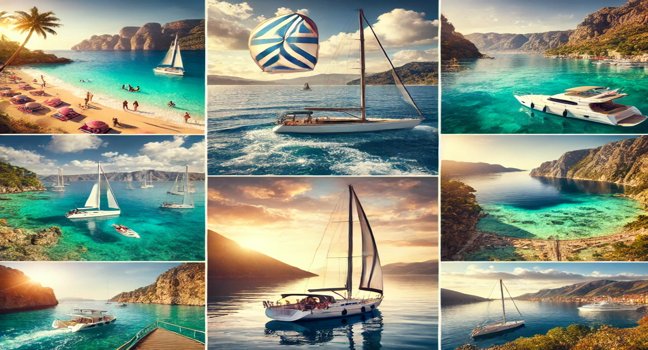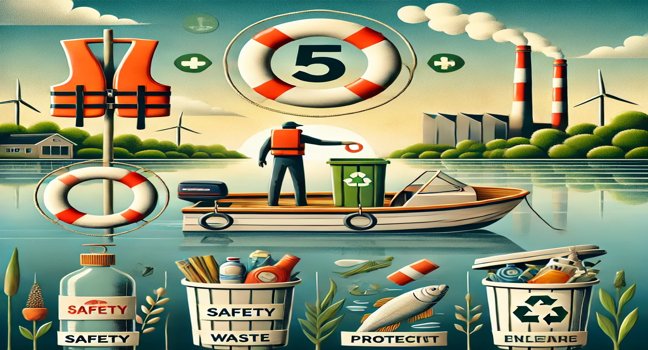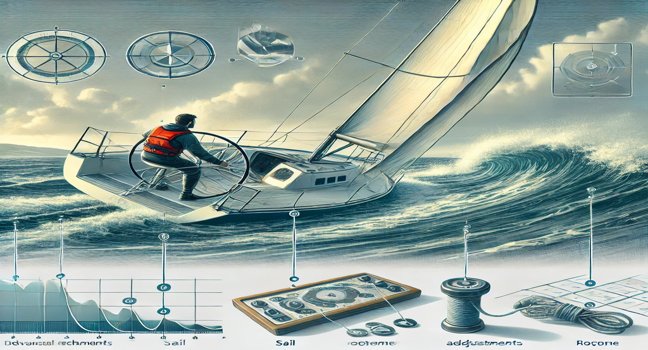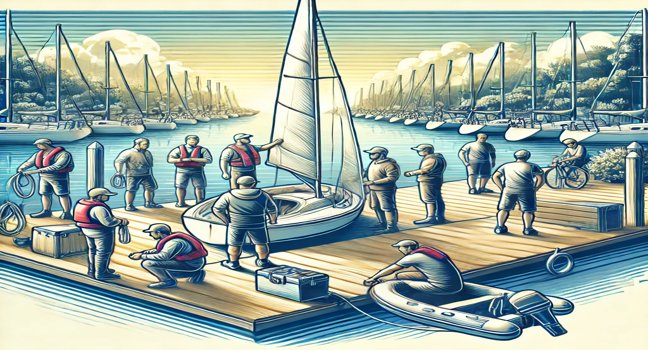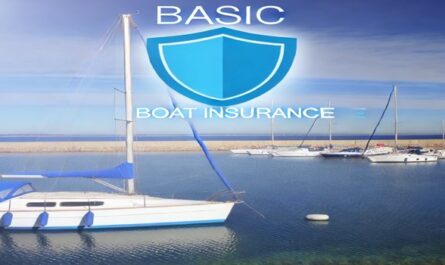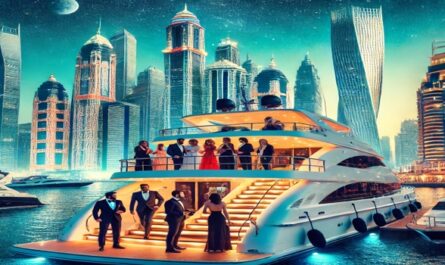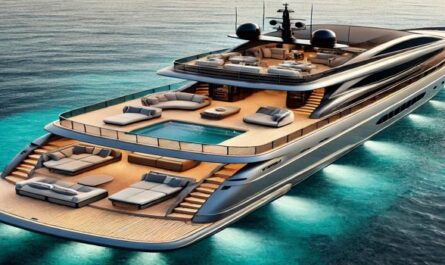Explore a Comprehensive Guide
- The history of these activities
- The different types of vessels
- Essential skills needed
- Popular destinations
- And important safety measures.
The History of Sailing and Boating
Sailing ships has a rich history that stretches back thousands of years. Early civilizations such as the Egyptians, Greeks, and Phoenicians used sailboats for trade and exploration. The earliest sailboats were simple rafts and small craft with basic sails. As technology progressed, so did boat designs.
During the Middle Ages, Europeans began developing more efficient and maneuverable sailboats. The Age of Exploration saw significant advancements in boat designs. Those advancements include the development of caravels and galleons, which played crucial roles in global exploration and trade. These innovations allowed explorers to navigate uncharted waters and establish new trade routes.
In the 19th and 20th centuries, the introduction of steam engines and hull designs revolutionized sailing and motorized boating.
Today, modern technology, such as GPS and advanced materials, has further transformed sailing and boating. These innovations have made navigation easier, improved safety, and expanded the possibilities for recreational and professional mariners.
Types of Sailing and Boating Vessels
There is a wide variety of vessels available for sailing and boating, each suited to different activities and preferences. Understanding the different types of boats can help you choose the right one for your needs.
1. Sailboats
Sailboats harness the power of the wind to move through the water. They come in several types:
- Dinghies: Small, lightweight, and easy to handle, dinghies are perfect for beginners and short trips. People commonly use them for racing due to their speed and agility.
- Cruisers: Larger sailboats designed for comfort and long-distance travel. Cruisers often feature spacious cabins, kitchens, and bathrooms, making them ideal for extended voyages.
- Racer-Cruisers: These boats combine the speed of racing sailboats with the comfort of cruisers. Designers made them for competitive racing but also offer amenities for leisurely cruising.
2. Motorboats
Motorboats use engines to propel through the water, offering speed and convenience. Types of motorboats include:
- Speedboats: Designed for high-speed performance, speedboats are popular for watersports, quick trips, and thrilling rides.
- Cabin Cruisers: Equipped with cabins and other amenities, cabin cruisers are suitable for longer trips and overnight stays. They provide comfort and convenience on the water.
- Pontoon Boats: Known for their stability and spacious decks, pontoon boats are ideal for leisurely cruising and social gatherings. Their flat-bottomed design makes them stable and comfortable.
3. Yachts
Yachts are luxurious vessels available in both sail and motor versions. They are designed for comfort and style:
- Sailing Yachts: These yachts offer a luxurious sailing experience, combining high-end amenities with the thrill of sailing. They are well-suited for long voyages and extended cruises.
- Motor Yachts: Focused on comfort and speed, motor yachts feature spacious interiors, gourmet kitchens, and luxurious accommodations. They provide a high-end cruising experience.
Essential Skills for Sailing and Boating
To ensure a safe and enjoyable experience, mastering several key skills is important:
1. Navigation
Effective navigation is crucial for safe sailing and boating. Learn how to read nautical charts, use GPS, and understand weather patterns. Good navigation skills help you plan your routes, avoid hazards, and reach your destinations safely.
2. Maneuvering
For sailboats, essential skills include tacking (turning the bow through the wind) and gybing (turning the stern through the wind). These maneuvers are crucial for controlling the boat and adjusting to changing wind conditions. For motorboats, mastering docking and maneuvering in tight spaces is important for safe operation.
3. Safety Procedures
Safety is a top priority on the water. Familiarize yourself with safety equipment such as life jackets, flares, and a first aid kit. Learn emergency procedures and conduct regular safety drills to prepare for unexpected situations.
4. Maintenance
Routine maintenance is essential for keeping your vessel in good condition. Regularly inspect and clean the engine, sails, hull, and safety equipment. Proper maintenance helps prevent problems and ensures a smooth experience with sailing ships .
Popular Destinations for Sailing and Boating
Sailing and boating enthusiasts can explore a wide range of beautiful destinations. Here are some top locations to consider:
1. The Mediterranean
Mediterranean Sea is a premier sailing destination, known for its stunning landscapes and charming coastal towns:
The Greek Islands:
Greek Islands, including Santorini, Mykonos, and Crete, offer beautiful scenery and great sailing opportunities. Each island has its own unique charm and attractions.
The French Riviera:
The French Riviera, with cities like Nice, Cannes and Monaco, provides a glamorous experience with sailing ships. This region’s luxurious resorts and vibrant culture make it a popular choice.
2. The Caribbean
The Caribbean is renowned for its clear waters and vibrant marine life:
The British Virgin Islands:
A favorite among sailors, the British Virgin Islands offer numerous islands and sheltered bays for exploration. The calm waters and beautiful beaches make it a top destination.
Barbados:
Barbados is known for its stunning beaches, lively culture, and excellent sailing conditions. The island offers a mix of relaxation and adventure.
3. The South Pacific
The South Pacific is home to some of the world’s most beautiful and remote islands:
Fiji: Fiji is famous for its crystal-clear waters, coral reefs, and vibrant marine life. It’s an ideal destination for diving and exploring.
Tahiti: Tahiti offers breathtaking landscapes and rich cultural experiences. The island’s stunning scenery and warm waters make it a fantastic location for sailing and cruising.
4. North America
North America provides diverse boating destinations, from lakes to coastlines:
The Great Lakes:
The Great Lakes offer extensive waterways, charming towns, and beautiful scenery. They are perfect for long cruises and exploring various ports.
The Pacific Northwest:
The Pacific Northwest, including Puget Sound and the San Juan Islands features rugged coastlines and stunning natural beauty. It provides unique opportunities and picturesque landscapes on sailing ships.
Safety and Environmental Responsibility
Staying safe and being environmentally responsible are key aspects of sailing and boating:
1. Safety Gear
Always carry essential safety gear on your vessel. This includes life jackets, flares, a first aid kit, and a marine radio. Regularly check that all safety equipment is in good working condition.
2. Weather Awareness
Keep an eye on weather conditions before and during your trip. Sudden changes in weather can affect safety, so you need to prepare for shifting wind and sea conditions. Checking weather forecasts regularly helps you plan and respond to changes.
3. Environmental Responsibility
Protecting the marine environment is crucial. Avoid anchoring in sensitive areas, dispose of waste properly, and minimize pollution. Respect wildlife and follow local regulations to help preserve natural habitats.
4. Training and Certification
Consider taking formal training and certification to improve your sailing skills. Courses are available for all levels, from basic boating safety to advanced sailing techniques. Proper training enhances your abilities and ensures a safer, more enjoyable experience.
Advanced Sailing Techniques
For those looking to further enhance their sailing skills, advanced techniques can offer a deeper understanding of the sport:
1. Spinnaker Sailing
A spinnaker is a large, colorful sail used to sail downwind. Learning how to handle a spinnaker effectively can increase your speed and improve your sailing performance in downwind conditions.
2. Navigation Using Celestial Bodies
Celestial navigation involves using the positions of the sun, moon, and stars to determine your position at sea. While modern GPS is more common, understanding celestial navigation can be a valuable skill for any sailor.
3. Heavy Weather Sailing
Sailing ships, requires specific techniques and equipment in heavy weather conditions. Learning how to handle strong winds and rough seas ensures safety and prevents damage to your vessel.
Joining Sailing and Boating Communities
Engaging with sailing communities can enhance your experience and provide valuable resources:
1. Sailing Clubs
Joining a sailing club offers opportunities for socializing, learning, and participating in events. Clubs often provide access to training, shared resources, and organized races.
2. Online Forums and Groups
Online forums and social media groups connect sailors and boaters from around the world. These platforms offer advice, share experiences, and provide information on destinations and equipment.
3. Regattas and Races
Participating in regattas and races can be a fun way to challenge yourself and improve your skills. These events often bring together enthusiasts of all levels and offer a sense of camaraderie and competition.
Get Ready For Your Next Maritime Adventure
Sailing and boating provide endless opportunities for exploration, relaxation, and adventure. By understanding the history, types of vessels, essential skills and popular destinations, you can enhance your experience. Making safety and environmental responsibility your number one will ensure that your maritime adventures are enjoyable and sustainable. Embrace the journey, learn new skills and let the winds guide you to new horizons on your next maritime adventure.

